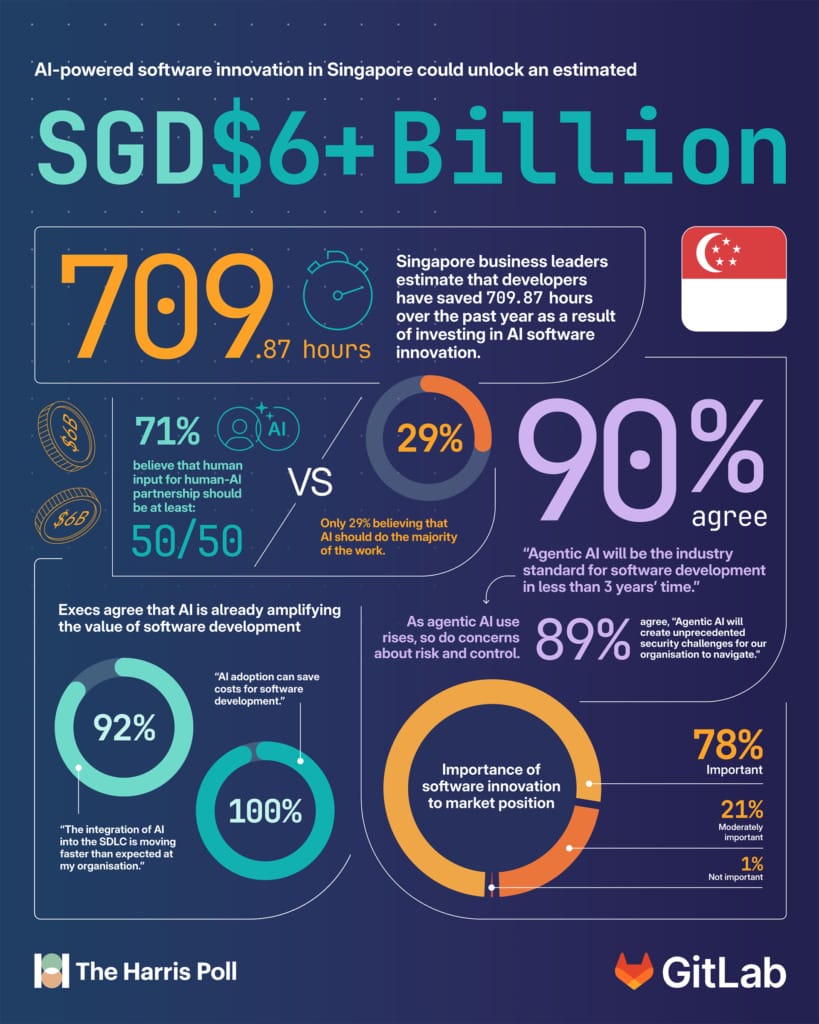GitLab survey shows AI software innovation could unlock over S$6 billion in Singapore
GitLab survey finds AI software innovation could generate over S$6 billion annually in Singapore, with skills and governance key to success.

Software innovation is emerging as a major growth driver in Singapore, with artificial intelligence playing a central role. A new study by GitLab Inc., conducted with The Harris Poll, reveals that AI-enhanced software innovation could generate more than S$6 billion in annual value for the country. The report, The Economics of Software Innovation: S$6B+ Opportunity at a Crossroads, surveyed 252 C-level executives in Singapore about the impact of software development on business outcomes.
Executives defined software innovation as creating new or significantly improved software to bring new capabilities, enhance efficiency, or solve problems differently. While AI adoption is already delivering strong returns, the study highlights tensions around skills shortages, governance, and the balance between human and machine contributions.
Human-AI collaboration and governance
Business leaders envision a future where humans and AI share responsibilities equally, but current practice shows humans handle about three-quarters of the work, with AI taking up one-quarter. This imbalance reflects both practical limits and lingering concerns over job security, system complexity, and cybersecurity.
Despite these challenges, AI-powered software is emerging as a key economic engine. Executives estimate that AI saves around S$31,213 per developer each year, which scales to more than S$6.24 billion in potential value across Singapore’s developer workforce. Nearly all respondents said software innovation is now a core business priority, with 64% reporting revenue growth tied to such efforts over the past year. On average, leaders expect a 39% boost in revenue and a 44% rise in developer productivity from AI adoption.
The rise of agentic AI, which enables systems to act independently in software development, is accelerating. Ninety per cent of respondents expect it to become the industry standard within three years. However, concerns remain about cybersecurity (53%), data privacy (49%), and ethical use (44%). To address these, half of executives are implementing governance frameworks aligned with regulations, while many are also drafting internal AI policies and establishing ethics committees.
Talent gaps and strategic alignment
The report also highlights the importance of human skills in the AI age. All surveyed executives agreed that human input remains critical in software development. Almost all (93%) said companies should prioritise training employees to collaborate with agentic AI, with most respondents supporting a balanced 50/50 human-AI partnership. Innovation and strategic vision ranked as the most valuable human contributions.
AI is now firmly on the agenda in Singapore’s boardrooms. Ninety-five per cent of executives said their boards understand the benefits of software innovation, and 83% reported a willingness to allocate more than half of their annual IT budgets to it. Nearly nine in ten companies have adopted frameworks linking software development directly to business outcomes, with cost efficiency, business growth, and problem-solving among the top performance indicators.
Craig Nielsen, vice president of Asia Pacific and Japan at GitLab, said: “AI-fuelled software innovation is an undeniable source of competitive advantage and economic impact, with 93% of executives in Singapore saying that it’s now a core business priority. The companies pulling ahead are the ones blending AI with human expertise, leveraging agentic AI with intention, aligning software strategy with business value, and building guardrails to innovate responsibly. With S$6+ billion per year in potential value at stake, the organisations that optimise this human-AI partnership today will define the future of software tomorrow.”

















